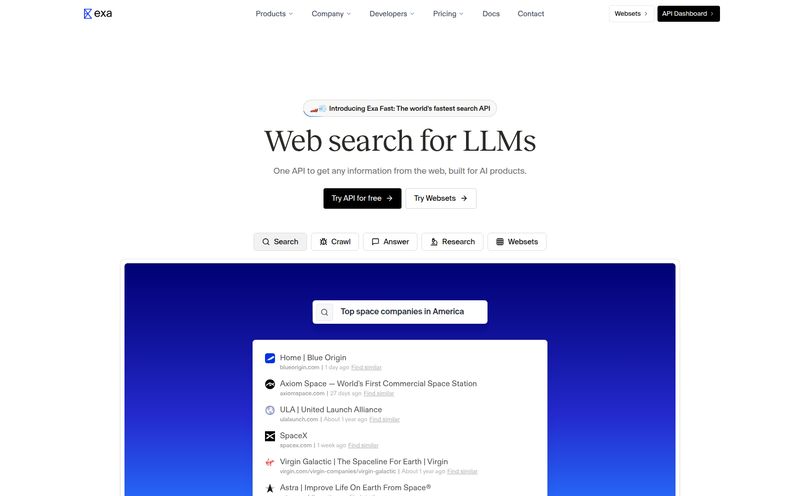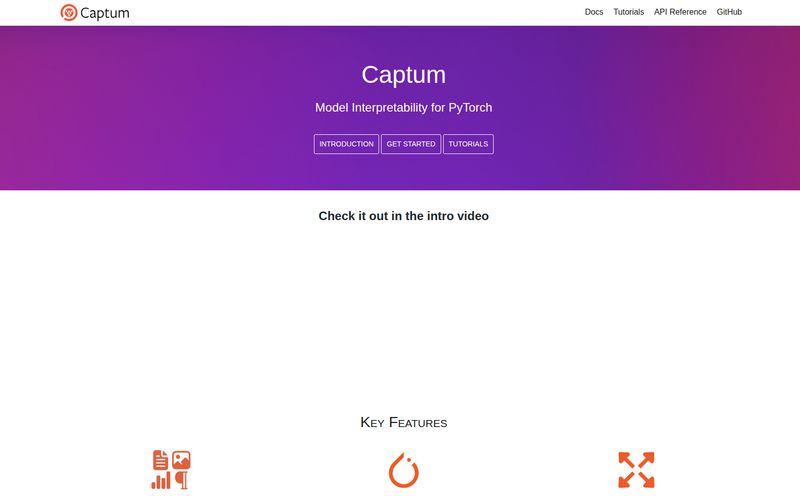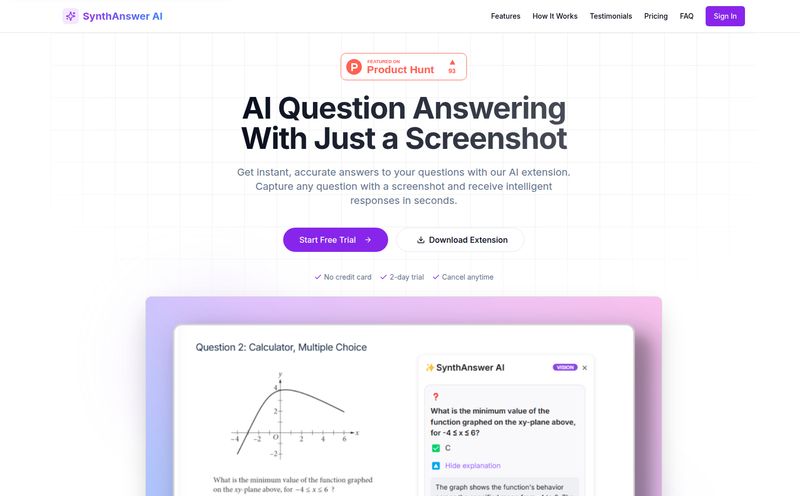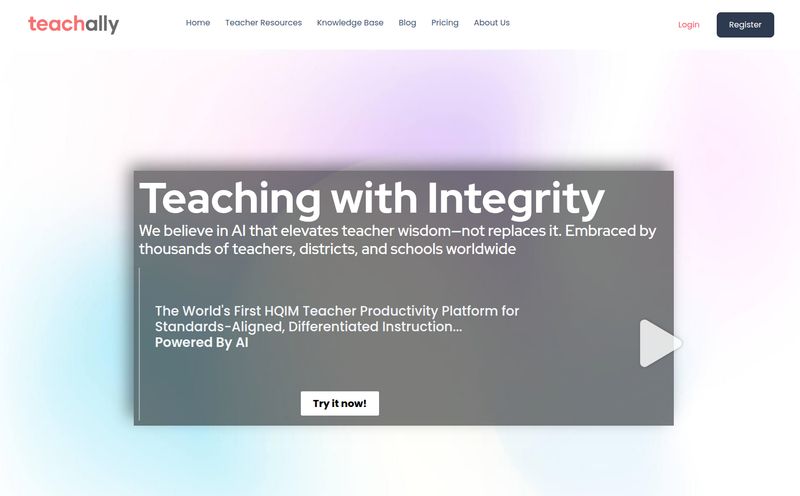The term "AI" gets thrown around a lot these days. It’s either going to save the world or become Skynet, with very little room in between. Every other startup is “AI-powered,” and my inbox is flooded with tools promising to use artificial intelligence to write my emails, design my graphics, and probably walk my dog soon. It's easy to get cynical.
So, when I came across the AI for Good foundation, my professional-skeptic-o-meter started twitching. Another organization with a lofty name promising to solve the world's problems with algorithms? I’ve seen a few of those. But I decided to put my cynicism on hold, grab a coffee, and do a proper deep dive. What I found was… well, it’s complicated. And fascinating.
This isn't just another tech company cloaked in non-profit branding. There's real substance here, but also a few quirks that make it feel, for better or worse, very human.
So, What Exactly is AI for Good?
At its heart, AI for Good is a non-profit organization focused on a pretty massive goal: tackling some of the world's most pressing challenges. Their official mission is to build "economic and community resilience through technology." That’s a mouthful, but what it boils down to is this: they use the power of artificial intelligence, combined with solid economic principles, to create tools and systems that help people.
This isn't about building a cooler photo app. It’s about creating systems to assist refugees, providing critical data for humanitarian aid, and auditing AI systems to make sure they’re fair and unbiased. They are trying to use AI as a scalpel, not a sledgehammer, targeting specific, difficult problems where technology can make a genuine difference. Being a non-profit is a huge part of their identity. They aren’t chasing venture capital or a billion-dollar valuation; they’re chasing impact. A refreshing change of pace, if you ask me.
A Look at Their Impactful Projects
Talk is cheap, especially in the tech world. The real proof is in the projects. And AI for Good has some genuinely impressive and thought-provoking initiatives. It’s not just theory; they’re in the trenches.
More Than Just a Slogan: Real-World Applications
One of the first things that caught my eye was their work with Economists for Ukraine. In a crisis, logistics and resource allocation are everything. They've been involved in providing humanitarian aid, which in today's world means a lot more than just sending supplies. It means data analysis, predictive modeling, and getting resources where they're needed most, fast. This is a prime example of using tech for immediate, life-saving impact.
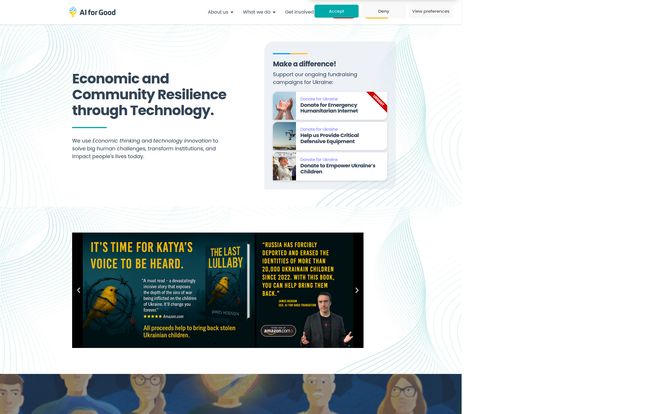
Visit AI for Good Foundation
Then there's their work on things like Intelligent Assistants for Refugees. Imagine arriving in a new country, not knowing the language or how to navigate the bureaucracy. An AI-powered assistant that can help with that process isn't just a convenience; it's a lifeline. It’s a direct application of natural language processing for human dignity.
They also perform AI Audits for businesses. This is HUGE. As more companies use AI for hiring, lending, and other critical decisions, the risk of bias is massive. An AI model trained on biased data will only perpetuate and amplify that bias. By offering audits, AI for Good is stepping into the role of a much-needed referee, pushing for fairness and ethical accountability in the industry. I have a lot of respect for that.
The Power of the Network: Who's Backing Them?
You can tell a lot about an organization by the company it keeps. When I scrolled down their homepage and saw their network partners, I had to raise an eyebrow. We’re talking about heavy hitters here: IBM, Amazon, Stanford University, Cargill, Cognizant.
These aren't companies that lend their logos out lightly. It suggests a level of seriousness and credibility that a brand-new non-profit might struggle to achieve. It’s like they say, it takes a village to raise a child, and apparently, it takes a global network of tech corporations and academic institutions to get an AI for social good initiative off the ground. This isn't a garage startup; it's a well-connected and serious operation.
The Good, The Bad, and The... 404 Error?
Alright, no organization is perfect. And as a blogger who prides himself on giving the full picture, I have to get into my own experience with their platform. There's a lot to love, but there are also areas where they could definitely improve.
What I Really Like About Their Approach
First off, the ambition is commendable. They aren’t shying away from the big, messy problems. Poverty, hunger, humanitarian crises. It takes guts to even put those on your roadmap. I also appreciate the multiple avenues for involvement. You can donate, partner up, or volunteer. It feels inclusive, like they genuinely want a community to form around their mission.
As someone who's always wary of black-box non-profits, seeing their emphasis on transparency and public financial records is a huge green flag for me. But the real gem, in my opinion, is their AI + Sustainable Development Goals Library. They’ve mapped AI opportunities to the UN’s 17 SDGs. This is an incredible resource, not just for them but for anyone in the development or tech space looking to make a difference. It’s a roadmap for positive impact, freely available. That's a class act.
Room for Improvement: A Friendly Critique
Okay, let's be real. The website, while packed with information, can be a little overwhelming. I found myself clicking through sections that seemed to repeat themselves, and it took me a minute to get a clear, linear story of their work. A bit of a user experience polish could go a long way.
More importantly, while they talk a big game about impact, I was left hungry for more hard numbers. Specific metrics and project outcomes could be featured more prominently. For the Intelligent Assistant for Refugees, how many people has it helped? What’s the average time saved on administrative tasks? For the Ukraine project, can we see data on the aid delivered? Turning these powerful stories into concrete case studies with real data would make their pitch unstoppable.
And now for the quirk. A tiny nitpick, but one that stood out to this digital native. Their main navigation has a "Store" button. Intrigued, I clicked it, hoping to maybe buy a cool t-shirt and support the cause. It led directly to a 404 Error page. Oops. It's a small thing, a broken link, but it’s one of those little details that can make a sleek operation feel a bit… unfinished. Perhaps it's a new feature they're still working on. I'll give them the benefit of the doubt.
How You Can Get Involved with AI for Good
So, you've read this far and you're intrigued. What now? The good news is, AI for Good makes it pretty clear how people can contribute to their mission. It’s not a closed-off club.
The most direct way is, of course, to Donate. As a non-profit, they run on the financial support of individuals and organizations who believe in their work. The second path is to Partner. This is likely geared towards corporations, academic institutions, and other NGOs who can bring resources, expertise, or data to the table. Given their existing network, they are clearly open to collaboration. Finally, they offer opportunities to Volunteer, allowing people to contribute their time and skills. This is fantastic for those in the tech and data science community who want to do pro-bono work that matters.
Is AI the Magic Bullet for Global Problems?
No. Of course not. And anyone who tells you otherwise is selling something. Technology is a tool. A powerful one, yes, but just a tool. A hammer can build a house or it can break a window; what matters is the intention and skill of the person wielding it.
This is where I think AI for Good is on the right track. Their focus isn't just on the tech itself, but on its application within complex human and economic systems. They seem to understand that an algorithm is useless without community context, without ethical oversight, and without a clear, human-centric goal. They are not positioning AI as a magic bullet, but as one powerful instrument in a much larger orchestra dedicated to solving problems.
Frequently Asked Questions (FAQ)
- Is AI for Good a legitimate non-profit organization?
- Yes, they are. They operate as a non-profit foundation. For any non-profit, you can typically verify their status through official government registries, like the IRS database for 501(c)(3) organizations in the United States, depending on where they are registered. They also mention public financial records, which is a good sign of legitimacy.
- What kind of projects does AI for Good support?
- They support a wide range of projects focused on humanitarian and economic issues. Key examples include humanitarian aid logistics for Ukraine, developing intelligent assistants to help refugees navigate new environments, and conducting AI audits to ensure algorithms used by businesses are fair and unbiased.
- How can I volunteer for AI for Good?
- Their website has a "Get Involved" section which is the best place to start. This is where they'll likely list any open calls for volunteers with specific skills in data science, software development, economics, or project management.
- How does AI for Good make money if they are a non-profit?
- Like most non-profits, their funding primarily comes from three sources: direct donations from the public, grants from larger foundations and government bodies, and corporate partnerships with companies that support their mission financially or with in-kind contributions.
- What are the Sustainable Development Goals (SDGs) they mention?
- The SDGs are a set of 17 interconnected global goals established by the United Nations in 2015. They are a "blueprint to achieve a better and more sustainable future for all," covering issues like poverty, hunger, health, education, and climate change. AI for Good's library connects AI initiatives to these specific goals.
My Final Thoughts
So, what's the verdict on AI for Good? I walked in a skeptic and I'm walking away a... cautious optimist. They are tackling monumental tasks with one of the most powerful technologies ever created. They have the right partners, a solid ethical foundation, and some genuinely impactful projects underway.
Are they perfect? No. The website could use a little tidying up, and I'd love to see more transparent, hard data on their project outcomes. That broken 'Store' link is a small but telling sign that they might be a bit stretched, focusing on the big work at the expense of the little details. And you know what? I can forgive that.
In a world drowning in AI hype, AI for Good feels like a genuine effort to point all that power in a direction that actually helps people. It's a reminder that the future of technology isn't just about what we can build, but about what we choose to build. And they seem to be making some pretty good choices.
Reference and Sources
- AI for Good Official Website: https://aiforgood.org/
- United Nations Sustainable Development Goals: https://sdgs.un.org/goals
